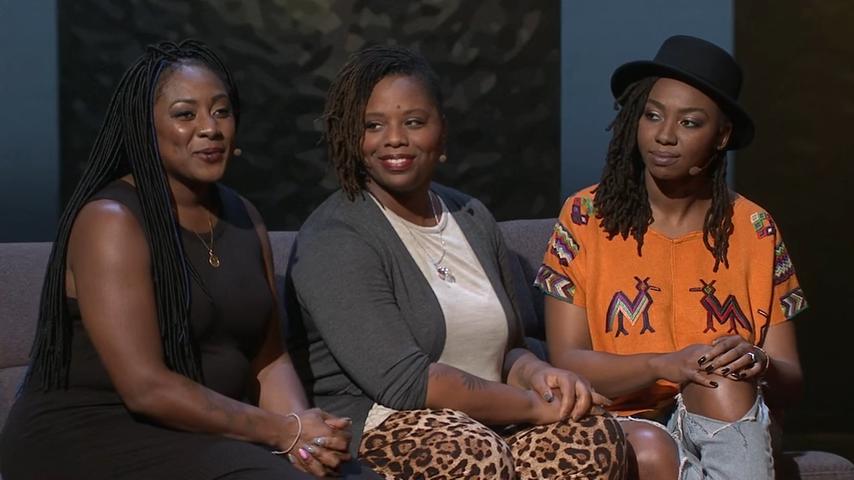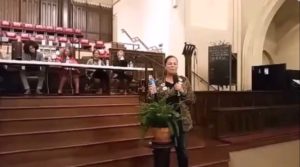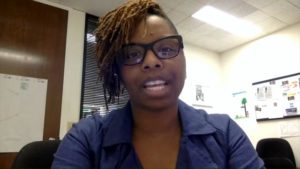 In an interview posted to social media, Black Lives Matter (BLM) Co-Founder Patrisse Cullors, along with BLM Los Angeles Co-Founder Melina Abdullah, discussed the “spiritual” component of the movement, explaining the practices and “rituals” performed to remember and “invoke” the spirits of deceased African Americans.
In an interview posted to social media, Black Lives Matter (BLM) Co-Founder Patrisse Cullors, along with BLM Los Angeles Co-Founder Melina Abdullah, discussed the “spiritual” component of the movement, explaining the practices and “rituals” performed to remember and “invoke” the spirits of deceased African Americans.
“We speak their names … [and] you kind of invoke that spirit, and then their spirits actually become present with you,” Abdullah, a professor at California State University, stated during the discussion hosted by Fowler Museum at UCLA.
Cullors outlined that she was raised Jehovah’s Witness, and “ancestral worship became really important” as she got older. She said that she felt a responsibility to honor the deceased politically and spiritually.
“In my tradition, you offer things that your loved one who passed away would want, whether it’s honey or tobacco or things like that,” she said, referring to the creation of an “ancestor altar,” which is sometimes practiced in African cultures. “It’s so important, not just for us to be in direct relationship to our people who’ve passed but also for them to know we’ve remembered them. I believe so many of them work through us.”
The site Crescent City Culture advises,“At its core, hoodoo is a practice of ancestral veneration. The honoring and even worshiping of ancestors is practiced around the world. Many African religions have a foundation in the belief that one’s ancestors play an active role in the life of the living even after death. The spirits of the dead are invited in the household so that they may influence the family and provide blessings and protection.”
“Why would we not honor the people who have been stolen from us and are asking for us to fight for them?” Cullors asked. “They want us to remember them because … they know what it takes for them to be remembered.”
She explained that even in using hashtags people are “literally almost resurrecting the spirit so they can work through us to get the work … done.”
Abdullah explained that whenever there is word of a African American person losing their life, likely in relation to law enforcement incidents, they go out and “pray [and] pour libation.” Libation is an act that is defined as “a ritual pouring of a liquid as an offering to a god or spirit, or in memory of those who have ‘passed on.’”

As previously reported, in 2018, Abdullah poured libation and summoned the spirits of a number of deceased African American leaders during an event at Hollywood United Methodist Church. She instructed those gathered to declare “ashe” as she made declarations and poured bottled water into a plant.
According to the website yagbeonilu.com, “ashe” or “ase” means “so be it,” and is an “African philosophical concept through which the Yoruba of Nigeria conceive the power to make things happen and produce change.”
“Ashe among the Yoruba is associated with the very force which is life and brings them into being in the universe. … [I]t is also associated with the power of speech as can be seen in its meaning of command, ordain and law,” the site explains, stating that the Yoruba believe that men possess the power to “speak things into existence.”
“We summon those spirits that are still with us. We summon those people whose bodies have been stolen, but whose souls are still here,” Abdullah said. “We call on Wakiesha Wilson. We call on George Jackson … Eric Garner …”
“And all of those whose bodies have been stolen: We ask that you be with us. We ask that you work through us. We ask that we do righteous work on your behalf,” she continued in speaking to the the dead.
“It took me almost a year for me to realize that this movement is much more than a racial and social justice movement. At its core, it’s a spiritual movement because we are literally standing on spilled blood,” Abdullah said during her recent interview with Cullors, adding that she knows the BLM co-founder has viewed the issue as spiritual for some time.
“When we first started, I remember us going to the ocean and doing these rituals and really feeding our spirit,” she outlined.
Cullors also explained that she considered whether there was room in the BLM movement for spirituality, and said that she “realized there was a need for protection as we started to be more targeted.”
“I feel like so many leaders and so many organizers are deeply engaged in a pretty important spiritual practice,” she said of BLM’s work. Cullors cited an article published by the Berkley Center for Religion, Peace and World Affairs entitled “The Fight for Black Lives Is a Spiritual Movement.”
“The movement for Black lives … infuses a syncretic blend of African and indigenous cultures’ spiritual practices and beliefs, embracing ancestor worship; Ifa-based ritual such as chanting, dancing, and summoning deities; and healing practices such as acupuncture, reiki, therapeutic massage, and plant medicine in much of its work, including protest,” the article states in part.
View the interview in full here.
 As previously reported, Black Lives Matter was formed by Cullors, Alicia Garza and Opal Tometi in 2013 in response to the acquittal of George Zimmerman in the shooting death of teenager Trayvon Martin. Cullors is a self-described “queer;” Garza identifies as lesbian; and Tometi is a self-described feminist.
As previously reported, Black Lives Matter was formed by Cullors, Alicia Garza and Opal Tometi in 2013 in response to the acquittal of George Zimmerman in the shooting death of teenager Trayvon Martin. Cullors is a self-described “queer;” Garza identifies as lesbian; and Tometi is a self-described feminist.
“While the tragic deaths of Trayvon Martin and Mike Brown were catalysts for the emergence of the BLM movement,” the bio for Garza, states, “in order to truly understand how devastating and widespread this type of violence is in Black America, we must view this epidemic through a lens of race, gender, sexual orientation, and gender identity.”
During an interview in 2015, Cullors acknowledged that the group is led by “trained Marxists” and talked about the group’s aim to include homosexual and transgender African Americans.
“It was important for us as Black women, two of which are queer, to actually talk about the totality of Black life,” she said during the interview with Jared Ball of “I Mix What I Like” on Real News Network. “And that Black cis[gender] men are not the sum of Black people, but rather all Black people being the totality of Black people …”
Cullors added that the group’s definition of totality would include “Black trans[gender] folk,” those who have been incarcerated or are currently behind bars, and those with disabilities.
“We make space for transgender brothers and sisters to participate and lead,” the BLM site’s “What We Believe” page also outlines. “We are self-reflexive and do the work required to dismantle cisgender privilege and uplift Black trans folk, especially Black trans women who continue to be disproportionately impacted by trans-antagonistic violence.”
“We build a space that affirms Black women and is free from sexism, misogyny, and environments in which men are centered,” it continues. “We foster a queer‐affirming network. When we gather, we do so with the intention of freeing ourselves from the tight grip of heteronormative thinking, or rather, the belief that all in the world are heterosexual (unless s/he or they disclose otherwise).”
Become a Christian News Network Supporter...


